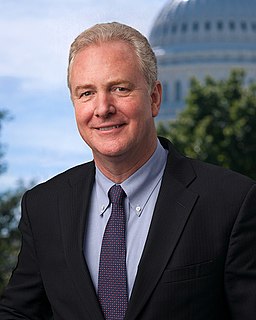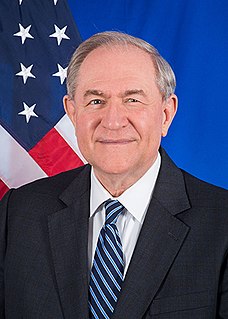A Quote by George H. W. Bush
I think 9/11 guaranteed that national security is going to be in the forefront of every election.
Quote Topics
Related Quotes
We have a media that goes along with the government by parroting phrases intended to provoke a certain emotional response - for example, "national security." Everyone says "national security" to the point that we now must use the term "national security." But it is not national security that they're concerned with; it is state security. And that's a key distinction.
National security is a really big problem for journalists, because no journalist worth his salt wants to endanger the national security, but the law talks about anyone who endangers the security of the United States is going to go to jail. So, here you are, especially in the Pentagon. Some guy tells you something. He says that's a national security matter. Well, you're supposed to tremble and get scared and it never, almost never means the security of the national government. More likely to mean the security or the personal happiness of the guy who is telling you something.
In that first national election after 9/11 in France, Jean-Marine Le Pen did not win the presidency, but he did get to the final round. He was in the general election. Now, this week, in the first national elections in France after what many people have been calling the French 9/11, the attacks in Paris three weeks ago, this time it`s Jean-Marie Le Pen`s daughter, Marine Le Pen and the National Front, which is still a far right pseudo-
fascistic party, they came in first place in France.
You know, the truth is that right after 9/11, I had a (flag) pin. Shortly after 9/11, particularly because as we're talking about the Iraq war, that became a substitute for, I think, true patriotism, which is speaking out on issues that are of importance to our national security, I decided I won't wear that pin on my chest.
I am deeply worried about Donald Trump on matters of national security. He doesn't know anything himself about it, and he has appointed a national security adviser, Mike Flynn, who is a pro-Russia conspiracy theorist, and he's just put Steve Bannon, a guy with connections to white supremacy and antisemitism, onto the National Security Council.
I was an Army intelligence agent and a veteran during the Cold War, assigned to West Germany. I was the chairman of the National Commission on Homeland Security and Terrorism for the United States for five years. I was a person who has dealt extensively with these homeland security issues. I was a governor during the 9/11 attack.
Even before September 11, there was a debate in the administration about whether or not military force should be used to oust Saddam Hussein. You're not going to find one person in the top echelons of the foreign policy and national security establishment in the U.S. government who's going to say that Saddam Hussein should not be out of power.

































